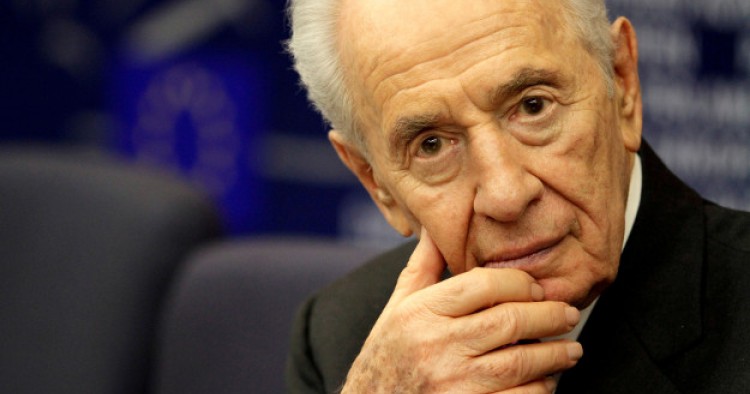The article was first published on NPR.
The last surviving leader of Israel's founding generation, Shimon Peres was a three-time prime minister, the architect of the country's secretive nuclear program and a winner of the Nobel Peace Prize for his efforts to make peace with the Palestinians.
Peres, who died Tuesday at 93 according to Israeli officials, was at the center of recurring Middle East dramas throughout his more than six decades of public life. Still in his mid-20s, Peres was put in charge of securing weapons for the main paramilitary in Israel's 1948 war of independence, and he remained in prominent roles until he stepped down as the country's president in 2014, at age 90.
In a remarkable career filled with great triumphs and bitter setbacks, he held more senior positions than any other Israeli, often at pivotal moments in the country's turbulent history. In addition to his tenures as president and prime minister, he served as foreign minister (three times), defense minister (twice), finance minister and transportation minister in Israel's ever-rotating coalition governments.
However, Peres was unable to obtain the prize he sought most: an Israel fully at peace with its Arab neighbors. And while Peres was celebrated internationally, he always struggled in Israeli elections, and many Palestinians felt his actions fell far short of his dovish proclamations.
Immigrant from Eastern Europe
Like many of Israel's founders, Peres' story began in a tiny Eastern European town. He was born Aug. 2, 1923, in Wiszniew, Poland, which is now Vishnyeva, Belarus. His family immigrated a decade later to what was then called Mandatory Palestine, under British rule.
In the first major Arab-Israeli war, in 1948, Peres played a key role in procuring arms for the Haganah, a militia that evolved into the Israeli military following the country's independence. Peres was rapidly promoted within the Defense Ministry, becoming director general several years later at age 29.
That made Peres a central figure during the 1956 Suez Canal crisis, when Israel, Britain and France joined forces in a bid to seize the crucial waterway from Egypt. While the military operation was a success, the political blowback from the U.S. and the Soviet Union forced those three countries to retreat and return the canal to Egypt.
This episode reflected Peres' more aggressive side during his younger years. Yossi Beilin, who would become a Peres ally and negotiate the secret Oslo Accord with the Palestinians in the 1990s, described Peres as "more hawkish than others" for decades.
Architect of Israel's nuclear program
Peres, meanwhile, would also make his mark as the man who developed Israel's nuclear program during the late 1950s.
"It was Shimon Peres who persuaded [Israel's first prime minister] David Ben-Gurion in 1956-57 that the time was right to initiate the nuclear project. From the beginning Peres was entrusted by Ben-Gurion to lead Israel's pursuit of a nuclear capability," wrote Avner Cohen, a leading authority on Israel's nuclear program.
Ben-Gurion and Peres believed a nuclear deterrent was crucial for the small, fledgling country surrounded by much larger Arab states. Peres rapidly built the program by working closely with France, a leading ally of Israel's at the time.
"Of all the countries engaged in nuclear research and development, only France might be prepared to help us," Peres would later write. "I believed, therefore, that all our diplomatic efforts should be focused on France."
Israel does not discuss details of its nuclear program to this day, but according to the CIA and others it is widely believed to have 100 or more nuclear weapons.
Throughout the 1960s, '70s and '80s, Peres moved from one top government job to another as coalition governments formed, fell apart and formed again. He was never far from the action whether it was a military, diplomatic or economic matter.
In the 1980s, Israel's economy crashed as inflation spiked to more than 400 percent a year. Peres negotiated with union leaders, major employers and central bank officials and forged deals to cut wages and freeze prices, moves that helped stabilize the economy. In the years that followed, he would be a leading advocate of the country's high-tech sector.
Peres first served as prime minister for just two months in 1977. He held the job again, from 1984-86, in an unusual arrangement brought on by a deadlocked election between his left-leaning Labor Party and the right-leaning Likud Party. Peres led the country for the first two years of a four-year term and was then replaced by the hawkish Yitzhak Shamir.
Secret peace talks
In 1987, the Palestinians launched an uprising, or intifada, that would last for six years. That was one of several developments, along with the Gulf War and the collapse of the Soviet Union in 1991, that led to a major international push to address the Israeli-Palestinian conflict.
The Israelis and Palestinians held secret negotiations in Oslo, Norway, and reached an interim deal that was signed on the White House lawn in 1993. With President Clinton presiding, Israel was represented by Prime Minister Yitzhak Rabin and Peres, then the foreign minister, and the Palestinians by their leader, Yasser Arafat.
The agreement called for talks to permanently end the conflict, and though that deal still needed to be negotiated, the three men were awarded the Nobel Peace Prize in 1994.
The Middle East Institute (MEI) is an independent, non-partisan, non-for-profit, educational organization. It does not engage in advocacy and its scholars’ opinions are their own. MEI welcomes financial donations, but retains sole editorial control over its work and its publications reflect only the authors’ views. For a listing of MEI donors, please click here.













